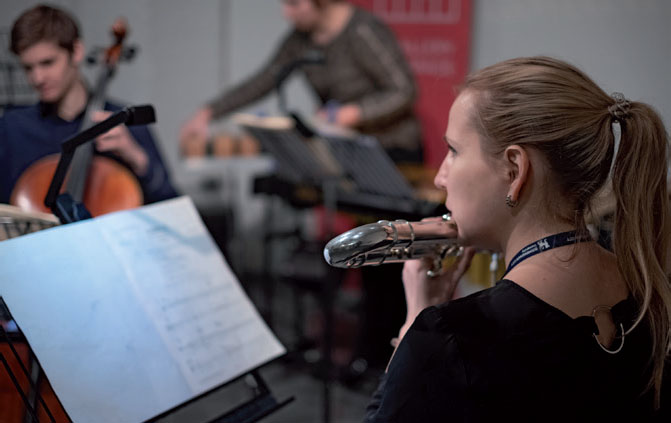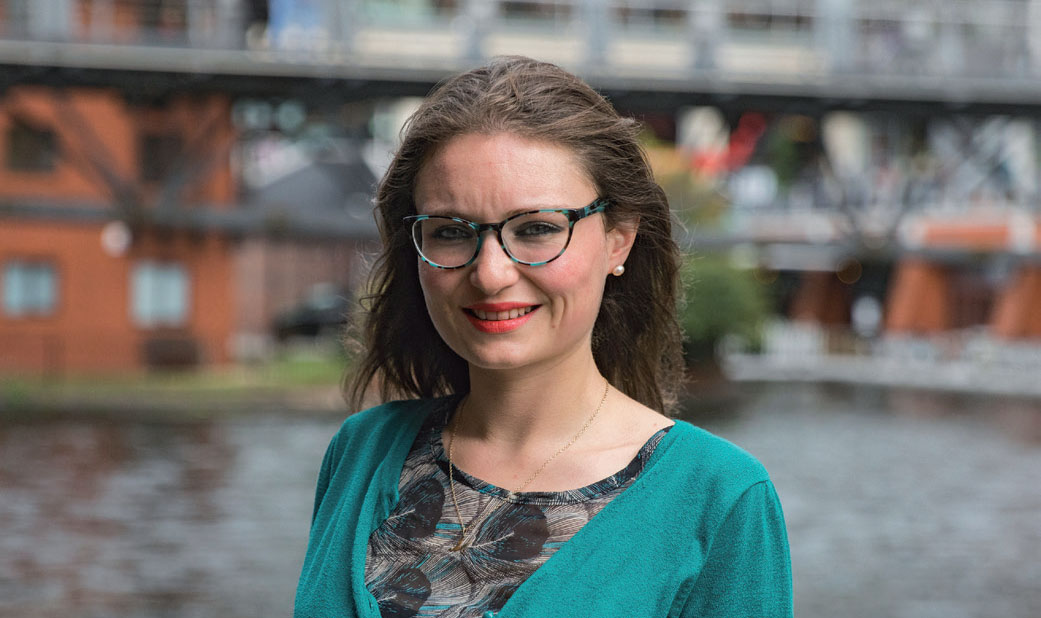
In 1987, musicians from the City of Birmingham Symphony Orchestra formed the Birmingham Contemporary Music Group (BCMG) with the aim of developing new music for audiences. Last year, it worked with the Royal Birmingham Conservatoire (RBC) to create NEXT, an innovative study programme aimed at supporting emerging contemporary musicians who want to turn their passion into a career. The course takes place over one year, with applications being welcome from instrumentalists, conductors and live electronic performers.
I spoke to the course's project manager, Miranda Heggie about how NEXT came about: ‘Our artistic director Stephan Meier wanted to set up something that supported the next generation of contemporary performers. There is such a wealth of knowledge here at BCMG, in terms of the musicians that play with us, that it makes sense to ensure that the talent is passed on.’

Keep your chin up!
The NEXT programme is currently being undertaken by 11 musicians, drawn from a number of countries, backgrounds and instruments. The one thing they share is a love of contemporary music – what made them in particular stand out? ‘They each sent a written application, which detailed, amongst other things why they were specifically interested in contemporary music,’ Heggie tells me. ‘From there, we invited some for auditions at RBC. The final cohort was selected on the strength of their written application and their practical audition.’
As this is the first year, I'm curious as to whether anything came up last year that will alter how applications are done going forward: ‘Not really,’ says Heggie, before elaborating further. ‘When we started the application process for the current cohort year, we could only get started once the funding was confirmed, so it was all condensed. As we know we've got funding for this year and the year after, we've been able to give ourselves a bit more time. I'm hoping to visit different conservatoires to talk to students and raise some awareness about NEXT.’
On the course
So once the next cohort is selected, I'm interested to know what sort of interesting things lie in store for them. ‘A lot of the work we do focusses on living classical composers,’ says Heggie. ‘We've done workshops with Brian Ferneyhough, Márton Illés, with workshops lined up with Rebecca Saunders. The course gets participants to look at pieces that employ different techniques, that might extend their approach to their own instrument. For example, we've been doing quite a lot of Stockhausen and some Grisey.’
Though it requires a lot of dedication, the course is not full time. Instead, the cohort comes together once a month for about a week at a time to work towards a particular goal. I ask Heggie what a typical week looks like: ‘There's a lot of rehearsals,’ she says. ‘The musicians will have parts from the pieces in advance so that they can do a lot of intensive practice when then come together during a project week. Since the musicians are based all over the UK, we want to make their time in Birmingham as productive as possible. When Illés worked with us in November, for example, the musicians were working on a couple of his pieces. These were a string quartet called ‘Torso V’, and a quartet for clarinet, piano, vioin and cello called ‘Drei Aquarelle’. The musicians prepared them to a rough standard during that week, workshopping them with Illés. They rehearsed in more detail before he came back in January for a day of intensive workshops with NEXT. This ended with performances of the pieces to an incredibly high standard by the end of the week. Our work in December was focussed on the music of Ferneyhough. He came to RBC for a special day that was centred around his work, as that was where he studied. It was a sort of welcome back. A few of the NEXT musicians worked on solo pieces by him, and a string quartet were coached by Ferneyhough and the Arditti Quartet, who were also there performing. These two things have been focal points of different project weeks.

Miranda Heggie, NEXT project manager
‘In February, we had a performance at Centrala, an art gallery here in Birmingham and that month's week was just spent rehearsing pieces for that concert. March's week was more like a fortnight, as there is a lot going on. The BCMG's main season concert features Rebecca Saunders and the world premiere of a concerto for the sheng so we arranged for the NEXT cohort to have rigorous workshops with Saunders and the sheng player Wu Wei.
‘Later on in the year, they'll be working with our learning team on a project called Music Maze which is for younger children. The children compose music for the NEXT musicians to play as part of their Music Maze workshops’
Looking ahead
Though there is still plenty of music still to be made by this year's cohort, the end of their amazing year is definitely coming into view so I ask Heggie what the BCMG's ambitions are for its NEXT musicians: ‘The course is about equipping people with the skills to be an all-round contemporary musician. They get one-to-one lessons with BCMG musicians, which helps them to develop the practical instrumental skills that they need to play contemporary music, while the project work gives them something to build a career upon. On the way they're interacting with key people from across the industry, and this network is great for enabling them to take the next steps.’
Indeed, it seems like those ambitions are already bearing fruit as the feedback from students has been great, with cellist James Heathcote saying: ‘The repertoire that we've been doing has been challenging and interesting, and we've had the opportunity to work with figures such as Brian Ferneyhough and Rebecca Saunders.’
Its Heathcote's fellow student, violinist Boglarka György, who manages to sum up the programme rather nicely: ‘The NEXT course has given me a great opportunity to meet and make friends with fantastic fellow musicians. It has also allowed me to be able to work with some of the most sought-after contemporary music composers and that has been a great experience.’
Applications for NEXT 2019–20 will open in spring 2019. Find out more about at bcmg.org.uk/next








